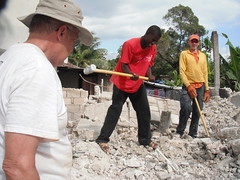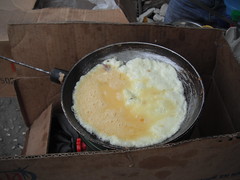As you know, Haiti is a tough place. It is hard. It is very hard. hard in many ways. It has been for a long time. This was made worse after the Earthquake, but even before January 12th, it was a difficult place to live, study, or invest. Now, almost five months after the quake it is even harder. Many hundreds of thousands of people, the best estimate is 1.5 million, live in tents, under tarps or sheets, or with family or friends whose homes were not destroyed.
Economically the situation is even worse. Getting accurate data is difficult in Haiti, but by some estimates the unemployment rate is about 70%, half the population (from Alertnet) is living on less than a dollar a day (40 Goude) (on the streets today I paid 10 Goude for a large banana). The highest estimate I have seen online of per capita GDP is $1,300 (for perspective the same US number is $46,000). According to Wikipedia, 30-40% of the Haitian's government's annual budget is from foreign aid. I could go on, but you get the idea, the Haitian economy is horrible.
A nation's economy is a funny thing. It is the sum of all individual business enterprises, but the individual enterprises all interact. In class this goes by many names (multiplier, contagion, etc), but the essential element is that no business is an island in and of itself. In other words, Company X depends on the employees of company Y to buy their product. WIthout a healthy Company Y, company X then shrivels and dies as well. WIth this in minds, as part of today's economic class, I invite you to mentally travel to Haiti, a land where the lack of plenty rules.

This mental trip requires you to imagine ou live in a tent in the middle of a Displacement Camp of 400 families. The area is muddy. You have one tent (supposed to sleep 3) and have a cotton sheet draped over the entrance as a slight reprieve from the 100 degree temperatures. Mud and standing water are your constant companions. Since everyone in the camp cooks with wood and/or charcoal and burns garbage, the area is always a bit smoky. Solitude is a dream. You have no electric, no running water, no bank account, no indoor plumbing, no indoor anything.
You share meals with whoever has enough to share, but most of the time you are hungry. You never have quite enough to satisfy your growling stomach. You survive in part on handouts from NGOs, in part from selling small trinkets at the equally dirty and muddy outdoor market.
Most of the town lives in conditions not unlike this. Take some time and imagine the feeling of hopelessness that must arise in this world. You and everyone you know are trapped in this world where economic prosperity is something you dare not even imagine.
You are not happy with the way things are and want to "better yourself." But how?
What to do? Many have started their own small, no microscopic, businesses; some sell bananas, others are walking pharmacies carrying large cones of pills of every variety from Amoxicillin to Viagra and everything in between. Others who have the good fortune of having an old refrigerator (remember there is no electricity), open a "bar" that sells soda and beer from the side of the road. Still others cook for others (the egg sandwich lady, the plantain woman, the Coca Cola man, etc). But seemingly none of them are what one in the more developed world would call economically successful.
To continue this mental exercise try to rise above this conditions. Go ahead and really try. How can you do it? Get a good job? There are few employers. Government jobs are either low paying, temporary, or go to official family and friends. Get an education? Good start but then what? That is why 80% of college graduates leave Haiti for better opportunities elsewhere. Have an idea for a new company? a new product? Who can afford it? Where can you get the capital needed to start it when most are living day to day. Need a location? You don't even have a home. Want to advertise to tell others? There is no local paper, no local TV, and internet advertising might as well be something from another planet.
These are some of the thoughts that have been going through my mind for the past ten days as we have cleared rubble, taught in schools, and toured the city of Leogane. I have to say it can be depressing to look ahead. One feels trapped pretty quickly.
So when Wesley, who is one of the people who we cleared rubble for, told me he was interested in starting his own business in order to afford college and to get ahead, it was almost my moral duty as a finance professor to help him develop his business plans. And so tonight, we met and spent about three hours developing a business plan for his proposed photography business. We discussed why people would want to invest (in order to make more money); we went over capital structure, risks, rewards, and competitive advantages. We spoke of accounting, taxes, marketing. In short for three hours I felt as if I were back in front of a college classroom, but this time a grade was not at stake, but an economic life.
It was economic development taken to the ground level. It is what Haiti needs.


